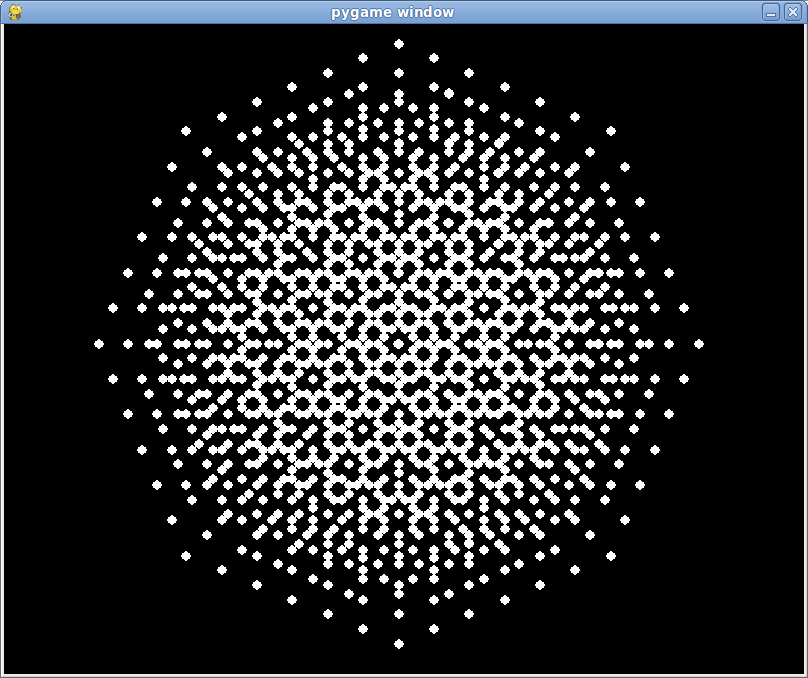Pretty fractal
I was experimenting with a pseudo-many-worlds quantum physics idea, and this screenshot came of it:
Beautiful, isn't it? Here's the source if you want to play around, it's optimized as much as I know how without switching to C, any suggestions would be welcome:
import pygame
from pygame.locals import *
from math import sin, cos, pi
pygame.init()
screen = pygame.display.set_mode((800,650), HWSURFACE|DOUBLEBUF)
clock = pygame.time.Clock()
base = pygame.Surface((10,10))
pygame.draw.circle(base, (255,255,255), (5,5), 5)
base.set_colorkey((0,0,0))
next_circs = [(395,320)]
keep_going = 1
poses = {}
angs = range(9)
off = 50
while keep_going:
clock.tick(1)
for event in pygame.event.get():
if event.type == QUIT or (event.type == KEYDOWN and event.key == K_ESCAPE):
keep_going = 0
print len(next_circs)
next_circs_h = []
for c in next_circs:
poses[c] = 0
screen.blit(base, (c[0] - 5, c[1] - 5))
for i in angs:
topleft = c[0] + off*cos(i*pi/4), c[1] + off*sin(i*pi/4)
if not poses.has_key(topleft):
next_circs_h.append(topleft)
next_circs = next_circs_h
pygame.display.flip()
Note I also tried two memoization techniques but the raw sin and cos appear to be faster anyway:
# first attempt
class memoize:
def __init__(self, fn):
self.mems = {}
self.fn = fn
def __call__(self, x):
if self.mems.has_key(x):
return self.mems[x]
else:
y = self.fn(x)
self.mems[x] = y
return y
# second attempt, almost as fast as raw sin/cos,
# a few secs faster than above
def memoize(f):
cache = {}
return lambda *args: cache[args] if args in cache else cache.update({args: f(*args)}) or cache[args]
@memoize
def cos_mem(x):
return cos(x)
@memoize
def sin_mem(x):
return sin(x)
Posted on 2010-11-22 by Jach
Permalink: https://www.thejach.com/view/id/145
Trackback URL: https://www.thejach.com/view/2010/11/pretty_fractal
Recent Posts
2026-01-06
2025-12-31
2025-11-10
2025-10-15
2025-08-18